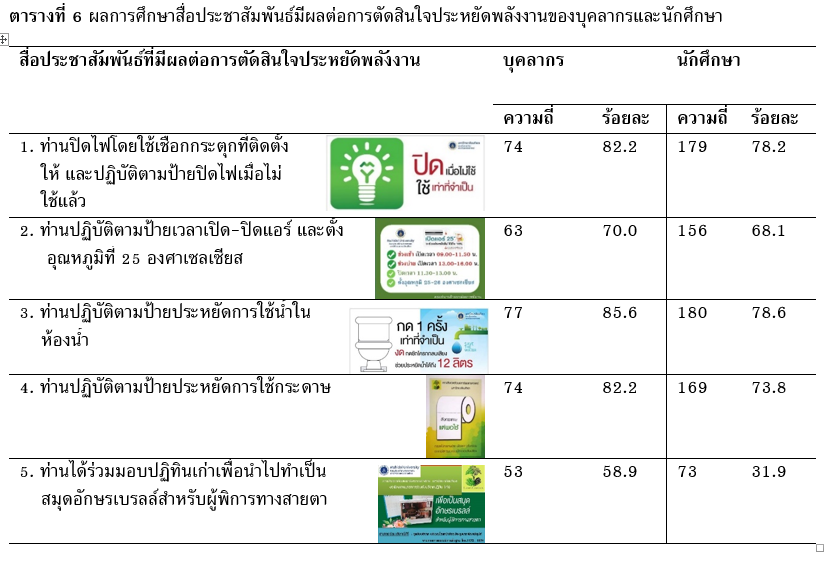Factors Affecting to Staffs and Student’s Behavior toward Low Carbon Faculty Policy of Faculty of Environment and Resource Studies, Mahidol University
Keywords:
Perception, Career Attitude, Behavior, Low Carbon FacultyAbstract
This research studied the perception, attitudes, subjective norm, and behavior toward the Low Carbon Faculty policy of the Faculty of Environment and Resource Studies. The total population of 319 participants consisted of staff (90 respondents) and students (229 respondents). Statistical analysis was performed using SPSS version 18. The frequency, percentage, mean, standard deviation, Independent Samples Test: T-Test, One-way ANOVA, and regression analysis were used. The results showed that the attitude toward behavior, willingness, and behavior of staff were at the highest level, while perceived behavioral control of behavior and the subjective norm were at a high level. The students’ attitude toward the behavior was at the highest level. Willingness, behavior, and perceived behavioral control were at a high level. The subjective norm about the behavior was at a middle level. Factors affecting the willingness of staff and students to adopt the behaviors were: the attitudes toward the behavior for the staff (β = 0.63, p-value=0.00), and for the students (β = 0.41, p-value = 0.00), the perceived control of the behavior for the staff (β = 0.28, p-value = 0.00), and for the students (β = 0.31, p-value = 0.00 ), and subjective norms about the behavior of the staff (β = 0.09, p-value = 0.02). The subjective norms about the behavior of the students negatively influenced their willingness (β = 0.04, p-value = 0.21). The willingness of staff and students has a positive influence on their behavior (β = 0.78, p-value = 0.00 and β = 0.63, p-value = 0.00, respectively) toward the Low Carbon Faculty policy.
References
สำนักงานคณะกรรมการพัฒนาการเศรษฐกิจและสังคมแห่งชาติ สำนักนายกรัฐมนตรี. สรุปสาระสำคัญแผนพัฒนาเศรษฐกิจและสังคมแห่งชาติ ฉบับที่ 12 (พ.ศ. 2560-2564) [อินเตอร์เน็ต]. 2560 [เข้าถึงเมื่อวันที่ 16 กุมภาพันธ์ 2564]. เข้าถึงได้จาก https://shorturl.asia/RgSlv
กรมส่งเสริมคุณภาพสิ่งแวดล้อม. คนเราตัดสินใจเพื่อสิ่งแวดล้อมได้อย่างไร. กรุงเทพฯ: ส.ไพบูลย์การพิมพ์; 2558.
Ajzen I. From intention to action: A theory of planned behavior. In: Kuhl J, Beckmann J (Eds.), Action Control: From Cognition to Behavior. Springer-Verlag, Berlin. 1985;11-39
Ajzen I. The theory of planned behavior. Organizational Behavior and Human Decision Process. 1991;50:11-39.
สุรเมศวร์ พิริยะวัฒน์, สรวิทศ นฤปิติ. ปัจจัยที่มีอิทธิพลต่อความตั้งใจลดการใช้รถจักรยานยนต์ของกลุ่มวัยรุ่นในสถานศึกษา: กรณีศึกษามหาวิทยาลัยบูรพา. วิศวกรรมสาร ฉบับวิจัยและพัฒนา. 2552;20(1):38-47.
นิศาชล รัตนมณี, ประสพชัย พสุนนท์. อัตราการตอบกลับของแบบสอบถามในงานวิจัยเชิงปริมาณ. Journal of Humanities and Social Sciences Thonburi University 2019:13(3): 181-188.
กันยารัตน์ สมบัติธีระ, ยุพา ถาวรพิทักษ์. อัตราการตอบกลับแบบสอบถามและปัจจัยที่มีความสัมพันธ์ต่อ อัตราการตอบกลับแบบสอบถามในการรวบรวมข้อมูลโดยการส่งแบบสอบถามทางไปรษณีย์ในงานวิจัยด้านพยาบาลศาสตร์และ สาธารณสุขศาสตร์. วารสารวิจัยมหาวิทยาลัยขอนแก่น. 2558;15(1):103-117.
Krejcie RV, Morgan DW. Determining sample size for research activities. Educational and Psychological Measurement 1970;30:607-10.
ชูศรี วงศ์รัตนะ. เทคนิคการสร้างเครื่องมือวิจัย : แนวทางการนำไปใช้อย่างมืออาชีพ. กรุงเทพฯ: อมรการพิมพ์; 2560.
Turner, Ronna C, Laurie C. Indexes of item-objective congruence for multidimensional items. International journal of testing 2003; 3:163-171.
Nunnally JC. Psychometric Theory (2nd ed.). New York: McGraw-Hill. 1978.
SPSS Inc. PASW Statistics for Windows, Version 18.0. Chicago: SPSS Inc. 2009.
โสภณ เบื้องบน, ชัยธัช จันทร์สมุด. ความรู้และพฤติกรรมการใช้ไฟฟ้าของนักเรียน นักศึกษาวิทยาลัยเทคโนโลยีสมเด็จพณิชยการ อำเภอสมเด็จ จังหวัดกาฬสินธุ์. วารสารสุขภาพและสิ่งแวดล้อมศึกษา 2564;6(1):73-9.
สุคนธ์ มาศนุ้ย. พฤติกรรมการประหยัดพลังงานเพื่อลดปัญหาภาวะโลกร้อนของบุคลากรสถาบันเทคโนโลยีพระจอมเกล้าเจ้าคุณทหารลาดกระบังกรุงเทพมหานคร. มหาวิทยาลัยบูรพา; 2551.
ปิ่นกนก วงศ์ปิ่นเพ็ชร์. ปัจจัยเชิงเหตุของพฤติกรรมสิ่งแวดล้อมของนักศึกษาปริญญาตรีมหาวิทยาลัยภาครัฐในเขตกรุงเทพมหานคร. สุทธิปริทัศน์ 2561;101:121-133.
นลินรัตน์ ถาวรเลิศรัตน์. ความสัมพันธ์ระหว่างความใส่ใจต่อสิ่งแวดล้อมกับทัศนคติและพฤติกรรมการอนุรักษ์สิ่งแวดล้อมของผู้บริโภค. วารสารนิเทศศาสตร์ 2553;28(1):105-27.
Paswan A, Guzmán F, Lewin J. Attitudinal determinants of environmentally sustainable behavior. Journal of Consumer Marketing 2017;34(5):414-426.
ภัทรพล บัญชาจารุรัตน์, หฤษฎ์สลักษณ์ วิริยะ, นิรันดร์ คงฤทธิ์. พฤติกรรมการมีส่วนร่วมของประชาชน เพื่อพัฒนาสังคมคาร์บอนต่ำในเขตเทศบาลตำบลกุดจิก อำเภอสูงเนิน จังหวัดนครราชสีมา. วารสารชุมชนวิจัย 2562;13(3):150-60.
Lee JWC, Tanusia A. Energy conservation behavioral intention: Attitude, subjective norm and self-efficacy. In Proceeding of 2016 International Conference on New Energy and Future Energy System. 2016;1-12.
ไพฑูรย์ พิมดี. บทความปริทัศน์:พฤติกรรมสิ่งแวดล้อม. วารสารครุศาสตร์อุตสาหกรรม 2564;20(1):A1-A5.
บุรฉัตร จันทร์แดง, เสาวลักษณ์ โกศลกิตติอัมพร และสัญญา เคณาภูมิ. ปัจจัยที่มีผลต่อการเปลี่ยนแปลงพฤติกรรม. วารสารวิชาการธรรมทรรศน์ 2562;4:235-44.

Downloads
Published
Issue
Section
License
บทความทุกบทความที่ตีพิมพ์ในวารสารการพัฒนางานประจำสู่งานวิจัย (JPR2R) ถือว่าเป็นลิขสิทธิ์ของวารสารการพัฒนางานประจำสู่งานวิจัย คณะสิ่งแวดล้อมและทรัพยากรศาสตร์ มหาวิทยาลัยมหิดล





